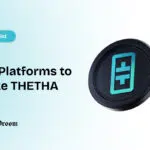In the current global financial system, the movement of money often involves various paths, including loaning. This holds in the cryptocurrency ecosystem as well. With the advent of decentralized finance (DeFi), there has been increased money movement in the crypto space, leading to significant advancements. However, unlike traditional finance, cryptocurrency loans take a different turn, including the more innovative NFT cryptocurrency loans.
- Understanding NFT Loans
- What is a Non-Fungible Token (NFT)?
- What is The Blockchain?
- What Are NFT Loans?
- How NFT Loans Work
- Step 1: Identify the Right NFT Loan Platform
- Step 2: Upload NFT and Set Details
- Step 3: NFT Appraisal
- Step 4: Take Out the Loan
- Step 5: Loan Repayment
- Advantages of NFT Loans
- Liquidity for NFT Holders
- Diversification of Portfolio
- Drive Value
- Zero Credit Checks
- Flexibility in Loan Terms
- Disadvantages of NFT Loans
- Volatility of The NFT Market
- Smart Contract Vulnerability
- Illiquid Collateral
- Regulatory Uncertainty
- Limited Standardization
- High Interest Rates
- Top 5 Platforms That Offer NFT Loans
- Conclusion
- Frequently Asked Questions (FAQs)
NFT loans entail using Non-Fungible Tokens (NFTs) as collateral to secure cryptocurrency loans in various tokens while still retaining ownership of the NFTs. The process mirrors traditional loans where collateral is provided in exchange for fiat currency. However, in this case, the entire process occurs on the blockchain, incorporating another facet of cryptocurrency—decentralized finance (DeFi).
This article goes into the specifics of what NFT loans are, how they operate, and how anyone can leverage this novel technology.
Understanding NFT Loans
To grasp the concept of NFT cryptocurrency loans, let’s establish a foundation on crucial aspects of cryptocurrency how they converge to form non-fungible token loans, and how one can capitalize on them.
What is a Non-Fungible Token (NFT)?
A non-fungible token (NFT) is a unique form of token used to represent ownership or proof of authenticity stored on the blockchain. These tokens can represent various items or digital assets, such as artwork, collectibles, music, etc. The key distinction lies in the fact that no two NFTs are identical, as they possess unique characteristics that set them apart from one another.
Non-fungible tokens differ from fungible tokens like Bitcoin, Ether, or fiat, which share identical properties. For instance, a $100 note is equivalent to any other $100 note and can be exchanged on a one-to-one basis.
Non-fungible tokens can be traded on various exchanges in exchange for another fungible token, such as Ether or Bitcoin. This trading capability provides creators of these non-fungible tokens with the opportunity to monetize their digital assets and gain recognition from them. Moreover, transparency and authenticity are achievable through the blockchain. This leads us to the next part: what is the blockchain?
Learn more about non-fungible tokens in this comprehensive guide by DroomDroom.
What is The Blockchain?
The blockchain is a decentralized digital ledger used to store data, such as transactions and digital assets like images. Its purpose is to ensure security, transparency, and immutability. Through the blockchain, an NFT can be uploaded securely with its details intact, without being interrupted or manipulated. The blockchain is also an integral part of the entire NFT loans and the backbone of their functionality.
What Are NFT Loans?
An NFT loan is a variation of a loan that exists in the cryptocurrency space. This type of loan involves using NFT as collateral in exchange for cryptocurrencies such as Bitcoin, Ether, or Matic. This loan can then be used to get involved or participate in another aspect of decentralized finance (DeFi).
Learn all there is to know about decentralized finance in this step-by-step guide by DroomDroom.
NFT loans are made possible through decentralized finance, where users have the ability to put up their NFTs, which are worth several thousand dollars, essentially providing liquidity for users and adding to the overall performance in the DeFi space. This method is unlike usual cryptocurrency loans where users stake a particular cryptocurrency to get another—usually at a lower loan-to-value ratio. An example is depositing Ether to receive Matic. This way, users still maintain their exposure to the market.
While the process is straightforward, several underlying factors are responsible for the success of NFT loans. Another section will go in-depth on how NFT loans work, explaining the mechanics behind their operation.
How NFT Loans Work
The process of acquiring cryptocurrency NFT loans is straightforward and follows a simple series of steps:
Step 1: Identify the Right NFT Loan Platform
The first step is to identify the right NFT loan platform that meets specific criteria, including security clearance and interactiveness.
Step 2: Upload NFT and Set Details
Once the NFT loan platform has been identified, you’re expected to upload your NFT onto the lending platform and set the requested details. This includes specifying the expected interest rate, loan amount, and duration.
Step 3: NFT Appraisal
At this stage, the uploaded NFT undergoes an NFT appraisal. Lenders examine the NFT to determine or estimate its value. The process is usually straightforward for established NFTs that are more recognized but may be more tedious for lesser-known NFTs. After the appraisal, the lending platform determines the value of the NFT.
Step 4: Take Out the Loan
After reviewing the uploaded NFT, borrowers can decide to take out a loan based on the agreed-upon value determined by the NFT lending platform. This loan is usually issued in stablecoin. The entire process is controlled and managed with the help of a smart contract, ensuring that the agreed terms are adhered to.
Step 5: Loan Repayment
In the final stage, which involves loan repayment, the borrower gains access to the locked NFT after fulfilling the repayment terms. In a situation where borrowers fail to meet the loan terms, the NFT is liquidated and transferred to the lenders.
Advantages of NFT Loans
Liquidity for NFT Holders
With NFT loans, an NFT holder has easy access to liquidity without having to sell their NFT. This process helps artists and other NFT creators retain ownership of their digital assets without letting them go due to insufficient liquidity.
Diversification of Portfolio
The funds borrowed through NFT loans can be deployed into other assets to generate more funds for the NFT owner or used to carry out other activities. This allows for portfolio diversification.
Drive Value
Unlike before when NFT holders were more interested in selling their digital assets to access liquidity, now they can easily access NFT loans, which helps in maintaining the value of their assets by reducing selling pressure and potentially creating more demand for the NFT.
Zero Credit Checks
NFT loans don’t require checking the borrower’s background credit history, as is required in traditional settings before issuing out loans. This provides an open playground for individuals with either bad or good credit history to benefit from the loan.
Flexibility in Loan Terms
There’s customization of loan terms for both lenders and borrowers, adding more flexibility to NFT loans. This way, there is more mutual agreement regarding loan terms, including interest rates and repayment schedules.
Disadvantages of NFT Loans
Volatility of The NFT Market
One of the major characteristics of the NFT market is its volatile nature. The value of an NFT can significantly drop, leading to liquidation and borrowers losing access to their NFT, causing a loss.
Smart Contract Vulnerability
Another disadvantage that is possible with NFT loans is the potential for a smart contract breach through hacks. This can have an impact on the NFT used as collateral and the loan taken out.
Illiquid Collateral
Some NFTs may be illiquid, causing a delay in liquidation in the case of default. With collateral not being able to be sold quickly, lenders risk losing their money from the deal.
Regulatory Uncertainty
There is a possibility of facing regulatory restrictions when dealing with NFT loans depending on your jurisdiction. This is due to the uncertain regulatory landscape of the NFT and the cryptocurrency market.
Limited Standardization
There is no standardized practice in the NFT marketplaces, which can lead to a variation in loan terms, valuation methods, and liquidation processes across several platforms.
High Interest Rates
The interest rate on NFT loans can be very high due to the risk and volatile nature of the market, causing high-interest loans in the markets. This makes borrowing NFT loans more expensive when compared to traditional loans.
Top 5 Platforms That Offer NFT Loans
There are several platforms offering NFT loans to simplify the process for both new and existing NFT holders.
NFTfi
NFTfi is one of the leading NFT lending platforms. It operates on a peer-to-peer model, connecting NFT owners with lenders. The platform facilitates NFT-backed loans, with borrowers using their NFTs as collateral. To date, NFTfi has provided over 56 thousand loans, totaling over $500 million in volume, with an average loan size of $9 thousand each.
Arcade
Arcade is another peer-to-peer NFT lending platform that allows NFT owners to list their trading terms and find a match with lenders. The platform offers various features, making it a preferred choice for many borrowers and lenders. These features include loan extensions, smart vaults, instant loans, and extension offers. What sets Arcade apart is its unique ability to allow users to combine multiple NFTs, wrap them into one, and offer them as collateral for loans. Since its inception, Arcade has facilitated over $150 million in transaction volume.
Nexo
Nexo offers a suite of financial services, including NFT lending. Known for its cryptocurrency exchange feature, Nexo allows borrowers to leverage up to 20% of the value of their NFT. This service is available for blue-chip NFT collections such as Bored Ape Yacht Club or CryptoPunks. Nexo is highly centralized, with specific rules governing the use of its NFT lending. Users with NFTs valued at over $500 thousand receive personalized account management and sign an agreement before accessing funds.
Zharta
Zharta is a borrower-friendly platform that simplifies the process of taking out NFT loans. Standout features include a fixed APR that doesn’t fluctuate based on asset utilization. NFT owners retain their NFT utility, such as claiming airdrops, access to events, and participation in discord servers.
BendDAO
BendDAO is a decentralized NFT lending platform that allows users to use their NFTs as collateral for instant access to liquidity. The platform includes a marketplace where NFT collections are listed, providing details such as floor prices, the number of active collateral, the amount available to be borrowed, and the proposed APR. Notable NFT collections available on BendDAO include Crypto Punk, Bored Ape Yacht Club, Mutant Ape Yacht Club, Azuki, Koda, Clone X, Doddles, and more.
Conclusion
Since the rise of NFTs and their widespread adoption, various utilities and innovations, such as their integration into X (Twitter) to signify ownership and the recent introduction of NFT lending, have expanded their use cases, bringing more functionality to the ecosystem.
As the world of non-fungible tokens continues to witness new innovations, the potential for further growth and diverse applications in the coming years remains high. The dynamic nature of NFTs suggests an ongoing evolution, paving the way for exciting developments in the future.
Frequently Asked Questions (FAQs)
What is an NFT Loan?
An NFT loan involves using Non-Fungible Tokens (NFTs) as collateral to secure cryptocurrency loans. It allows individuals to borrow cryptocurrencies while retaining ownership of their NFT assets.
How Do NFT Loans Work?
NFT loans typically involve uploading NFTs to a lending platform, setting loan details, undergoing an appraisal, receiving a stablecoin loan, and repaying it. Smart contracts play a crucial role in managing and enforcing the agreed-upon terms.
Which Platforms Offer NFT Loans?
Some platforms that offer NFT loans include NFTfi, Arcade, Nexo, Zharta, and BendDAO. These platforms provide various features and services, connecting NFT owners with lenders in the cryptocurrency space.
NFT Loan Process Step-by-Step?
Search for detailed step-by-step guides on how to take out NFT loans, covering the identification of platforms, NFT uploading, appraisal, loan issuance, and repayment.
Comparisons Between NFT Loans and Traditional Loans?
Explore articles or blog posts that compare NFT loans with traditional loans, highlighting the differences in processes, risks, and benefits.
Regulatory Landscape for NFT Loans?
Search for information on the regulatory landscape surrounding NFT loans, considering jurisdiction-specific regulations and any potential legal implications.




















